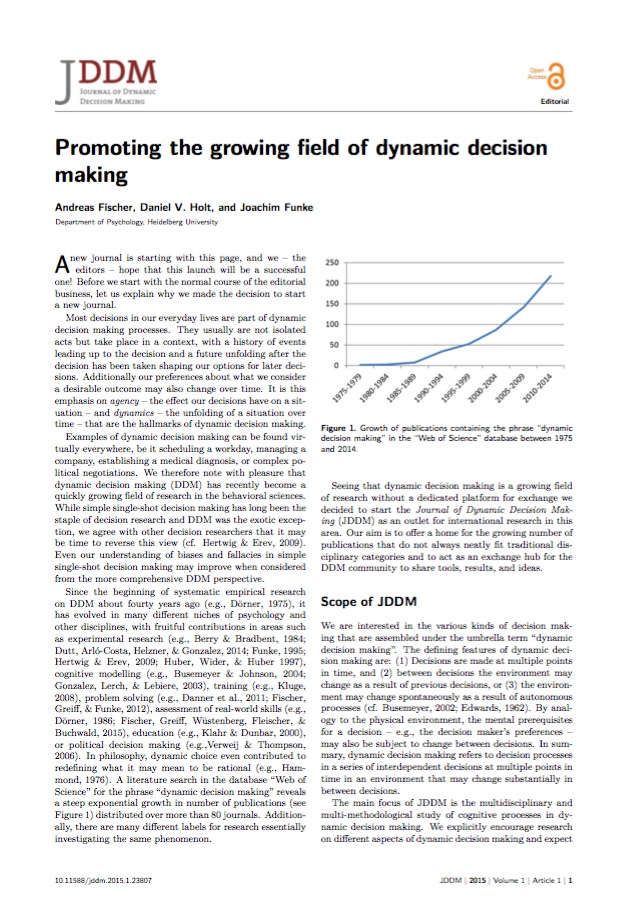Roughly a year ago I mentioned in this blog our plans to publish a new journal – the „Journal of Dynamic Decision Making“ (JDDM). Now the first articles have been published and more are in the pipeline. Together with Andreas Fischer and Daniel Holt, I wrote an Editorial that gives some insights into our ideas. Here are some excerpts from that statement:
„Most decisions in our everyday lives are part of dynamic decision making processes. They usually are not isolated acts but take place in a context, with a history of events leading up to the decision and a future unfolding after the decision has been taken shaping our options for later decisions. Additionally our preferences about what we consider a desirable outcome may also change over time. It is this emphasis on agency – the effect our decisions have on a situation – and dynamics – the unfolding of a situation over time – that are the hallmarks of dynamic decision making.
Examples of dynamic decision making can be found virtually everywhere, be it scheduling a workday, managing a company, establishing a medical diagnosis, or complex political negotiations. We therefore note with pleasure that dynamic decision making (DDM) has recently become a quickly growing field of research in the behavioral sciences. While simple single-shot decision making has long been the staple of decision research and DDM was the exotic exception, we agree with other decision researchers that it may be time to reverse this view (cf. Hertwig & Erev, 2009). Even our understanding of biases and fallacies in simple single-shot decision making may improve when considered from the more comprehensive DDM perspective.
Since the beginning of systematic empirical research on DDM about fourty years ago (e.g., Dörner, 1975), it has evolved in many different niches of psychology and other disciplines, with fruitful contributions in areas such as experimental research (e.g., Berry & Broadbent, 1984; Dutt, Arló-Costa, Helzner, & Gonzalez, 2014; Funke, 1995; Hertwig & Erev, 2009; Huber, Wider, & Huber 1997), cognitive modelling (e.g., Busemeyer & Johnson, 2004; Gonzalez, Lerch, & Lebiere, 2003), training (e.g., Kluge, 2008), problem solving (e.g., Danner et al., 2011; Fischer et al., 2012), assessment of real-world skills (e.g., Dörner, 1986; Fischer et al., 2015), education (e.g., Klahr & Dunbar, 2000), or political decision making (e.g., Verweij & Thompson, 2006). In philosophy, dynamic choice even contributed to redefining what it may mean to be rational (e.g., Hammond, 1976). A literature search in the database “Web of Science” for the phrase “dynamic decision making” reveals a steep exponential growth in number of publications (…) distributed over more than 80 journals. Additionally, there are many different labels for research essentially investigating the same phenomenon.
Seeing that dynamic decision making is a growing field of research without a dedicated platform for exchange we decided to start the Journal of Dynamic Decision Making (JDDM) as an outlet for international research in this area. Our aim is to offer a home for the growing number of publications that do not always neatly fit traditional disciplinary categories and to act as an exchange hub for the DDM community to share tools, results, and ideas.
…
Just in time for the 40th anniversary of the pioneering work of Dörner (1975), who initiated computer-based research on dynamic decision making in complex environments in Europe, we are glad to present the first issue of the Journal of Dynamic Decision Making (JDDM) as an outlet for international research in this field. So, if you have an interesting data set, a good theory, or a convincing simulation study just waiting to get published, get in touch!“
JDDM is a peer-reviewed Open Access journal (see the OA logo on each title page) in English language and can be found here: http://journals.ub.uni-heidelberg.de/jddm The first three articles have been published already, more to come!
